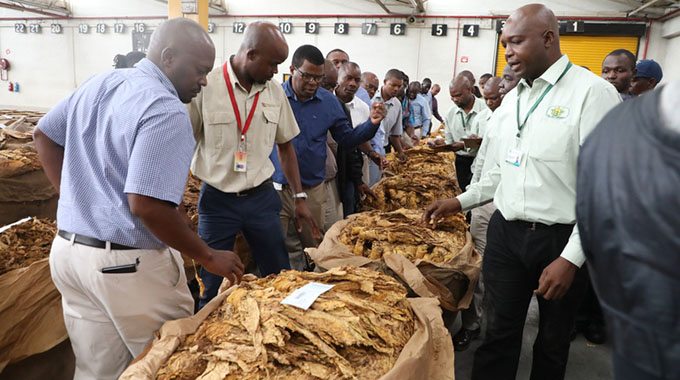Source: Editorial Comment: Tobacco sales must proceed in a safe way | The Herald

Tobacco is one of Zimbabwe’s biggest foreign currency earners and a major source of income for thousands of farmers and processing workers.
It is important that we figure out how farmers can deliver the cash crop and how merchants can buy it without compromising public safety.
Unlike the proceeds of minerals, which are finite — tobacco — as long as good agronomic practices are adhered to and sustainable sources of energy for curing are used, the crop is as good as a renewable resource that can continue to support the country’s industrialisation agenda.
That is why tobacco auction sales and deliveries to contract floors should be carried out under specific public health conditions, regardless of whether or not the lockdown is extended, for even if it does end this weekend, stringent health measures must remain.
Measures have to be put in place to ensure sales proceed under the watchful eye of the Ministry of Health and Child Care and under conditions approved by public health experts and enforced by the entire industry.
We believe the tobacco stakeholders meeting today can yield detailed measures since the Tobacco Industry and Marketing Board (TIMB) has been thinking long and hard and has come up with a system that basically ensures safety, although today’s meeting can refine it and extend it.
Among what TIMB is proposing we also want to see the following: Anyone without business at the auction floors should not be allowed access; traders should not be allowed to interfere with selling; all auction floors to have body temperature thermometers and sanitisers; social distance to be enforced; farmers should book in advance before bringing their tobacco; sales should be cleared within 24 hours and farmers should leave the floors immediately; reduce unnecessary bales rejection that results in people spending more time at floors; Ministry of Health officials should supervise all sales and with powers to recommend closure of facilities not adhering to regulations
Not only will this ensure that Zimbabwe earns the required foreign currency, it will also ensure that tobacco farmers and contractors who have invested lots of time and inputs into the crop will benefit from their investment.
The structure of the local tobacco industry is such that the majority of primary producers are indigenous Zimbabweans.
Prior to land reform, about 1 500 large-scale tobacco farmers produced 97 percent of tobacco in 2000, but the number of indigenous smallholder farmers had risen to over 110 000, producing around 65 percent of the crop by 2013 and those figures are much higher today.
Last year, Zimbabwe’s tobaco producers — mostly smallholder farmers — produced 258 million kilogrammes, a record crop bringing farmers the equivalent of US$500 million and significant extra being earned by the value-added processing, packaging and other local inputs.
Postponing deliveries and sales is not much of an option.
Most small-scale farmers who produce most of the crop, do not have the facilities on their farms to store tobacco and the crop will deteriorate, be damaged and be largely destroyed if not delivered.
The most critical measures will be to ensure that farmers do not congregate, do not linger in Harare and preferably do not even come into town at all.
So we can go further. Many contractors already have a collection service and this can be extended.
We have been waffling about decentralisation for years, but it seems obvious that proper collection centres can be opened in the hub towns of the major tobacco areas: Centenary, Karoi, Chinhoyi, Bindura, Marondera, Rusape and Mutare could be the first.
Over the years, a strong relationship of mutual trust has been built up among farmers and contractors.
It might not be perfect, but it is strong.
Contractors who cheat their farmers find themselves with no crop the next year; farmers who cheat contractors find themselves without inputs.
So it should be possible to ensure that most farmers do not have to bring their crop to Harare.
Those that do, and those that deliver to provincial centres must book.
Even crops destined for auction floors can be delivered to a centre near the farm at a booked time and day, and transport arranged at cost to bring it to the floors.
The TIMB can police this system of decentralisation and handle complaints.
Even at decentralised depots and the main floors, simple measures such as keeping adequate social distancing and hand sanitisation procedures are adhered to.
China is Zimbabwe’s biggest tobacco buyer, purchasing — on average almost half of Zimbabwe’s tobacco each season, which is approximately US$500 million.
Early last month secretary-general of the Chinese Chamber of Enterprise in Zimbabwe, Jay Li, told our sister paper Business Weekly that the Covid-19 pandemic will not stop China from buying Zimbabwe’s world-renowned Virginia flue-cured tobacco this year.
COMMENTS